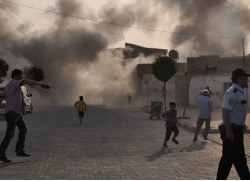
There is a reason that poppies are the main cash crop of Afghanistan. Money. Money is a powerful motivator for struggling farmers in one of the poorest countries in the world. Farmers who are desperate for money to feed their families turn to poppy cultivation despite awareness of the risks associated. The people are poor and feel they have no choice when growing wheat pays $0.40/kilogram while the price of dried opium pays $254/kilogram, according to a 2012 Opium Risk Assessment Survey by the UN Office on Drugs and Crime.
During the 1990s, the world’s illicit opium production shifted from Southeast Asia to Afghanistan. Today, Afghanistan is responsible for producing about 90 percent of the world’s supply of illicit opium. Taliban insurgents annually receive about $125 million from the opium farmers and traders. When the government threatens crops, peasant farmers turn to the Taliban for protection and willingly pay “taxes” in order to safeguard their meager livelihoods. The Taliban takes this money to finance the insurgency. The Taliban is not the only group that benefits; corrupt government officials at every level take advantage of the disorder and chaos via bribes and making deals for government protection.
American soldiers in Afghanistan ignore the vast fields of poppies in order to avoid pushing the farmers closer to the Taliban. Instead, the American government pays the Afghan government $250 for every hectare that Afghan officials destroy. Unfortunately, the Afghan government does not make equitable decisions about which fields are eradicated. Allies are ignored while personal enemies and those that are not tied into the local power structure become the focus. This leads to more drug production and stronger support for insurgents.
The State Department’s Assistant Secretary for International Narcotics and Law Enforcement, William R. Brownfield, recently said during an interview, “… if you do not address the drug issue you will not succeed in the other security, stability, democracy, prosperity objectives you are aiming for.” Policy makers in America believe that winning the war on opium is a precursor to winning the war against the Taliban. It has been argued that it is time to turn this conventional wisdom upside down. According to author Jonathan Marshall, “Fighting drugs is not a precondition for security. On the contrary, security is a necessary condition for curbing drugs.” Agronomists David Mansfield and Adam Pain have summarized years of local research and found that evidence supports the theory that the growth of the opium poppy economy is the effect, not the cause of state and development failure in Afghanistan.
The recent history lessons of Lebanon and Burma may have a few suggestions for Afghanistan’s current drug problem. If the warring parties first reach a political agreement then the rebuilding of political institutions and domestic security can begin. This will likely require power sharing with the Taliban rather than a total surrender by them and participation and support from regional powers such as Iran and Pakistan. Solving the drug war will involve more inclusion, compromise, and coexistence than all the vested parties have previously demonstrated. The wide reaching effects of the drug trade in Afghanistan require a shared responsibility for solving the problem.
Sarah Emery is a 2L and the Business Editor of the Denver Journal of International Law and Policy.


